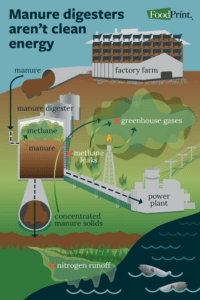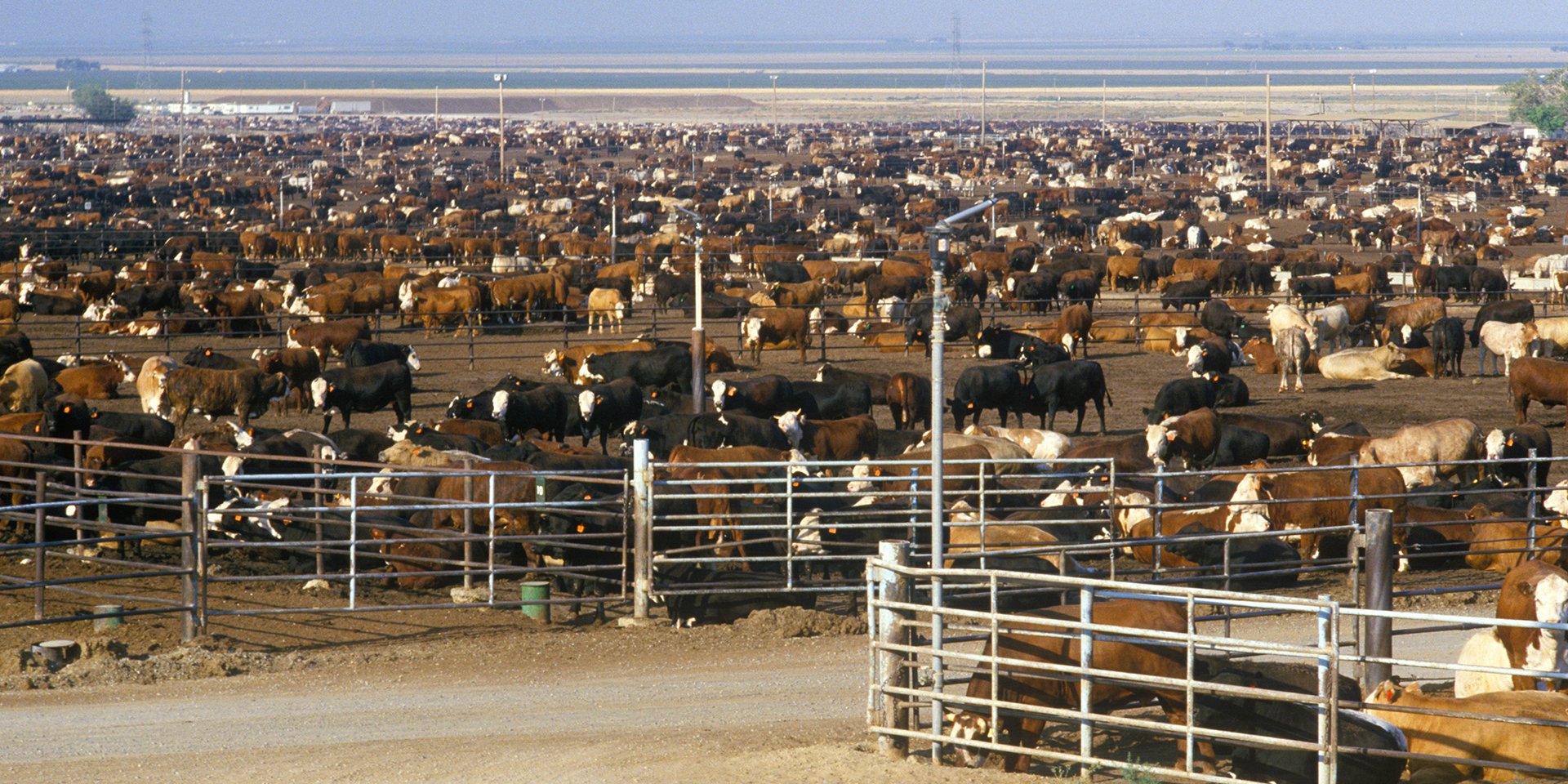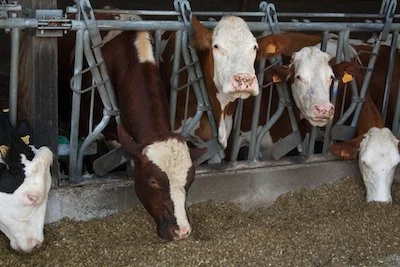Manure digesters aren’t clean energy
A self-declared “nerd” scientist shares with a giggle that her job is “turning poop into energy.” A narrator explains that Chevron is “partnering with farmers” to turn “everything from plants to cow manure” into clean energy.
You might have seen ads like these painting a hopeful picture of oil companies using the methane emissions of factory farms as green energy, presenting it as a brilliant way to repurpose waste while also slashing fossil fuel use. But like many convenient solutions, it’s a little too good to be true.
Climate scientists say that quickly reducing emissions of methane, a potent contributor to global warming, is essential to avoiding the worst impacts of the climate crisis. As a result, attempts to reduce those emissions are getting a lot of airtime and attention from policymakers, with one proposed solution — manure digesters — taking off in popularity around the country. California, which hosts a number of big digester projects in connection with the state’s megadairies, is encouraging their construction by offering generous credits to farms that capture and sell methane to be burned as energy.
As they stand now, California’s rules treat factory farm gas like it’s a carbon-negative fuel. But that’s not actually the truth: While manure digesters can capture much of the methane that would otherwise get emitted by lagoons of decomposing manure, they certainly aren’t absorbing methane from the atmosphere. So how do these manure digesters work, and why are they getting so much attention from policymakers as a climate solution?
What is methane?
Methane is a greenhouse gas — one that holds heat from the sun in the atmosphere, contributing to global warming — that comes mainly from bacteria digesting organic matter under conditions without oxygen. Usually carbon dioxide gets most of the attention in discussions about greenhouse gases, but methane is actually stronger: Over the course of 100 years, a kilogram of methane will hold about 28 times more heat than a kilogram of carbon dioxide.
Most methane emissions come from agriculture, with the largest portion burped out by cows, sheep and goats after bacteria in their guts break down fibrous food. Livestock manure can also emit methane if it decomposes in oxygen-free environments like the manure lagoons (giant open-air pits where liquified manure builds up) that are common on industrial farms where cows, pigs and chickens are usually raised. These manure-derived emissions are the second biggest source of methane in U.S. agriculture, and reducing them is a priority of scientists and policy makers.
What are methane digesters?
Methane digesters claim to solve factory farming’s manure problem by capturing the methane generated by decomposing manure. The resulting product, called “biogas” by petrochemical companies and factory farm lobbyists, is branded as clean energy, though it’s essentially the same product as the fossil fuel-derived natural gas used to heat homes. Sustainable farm advocates commonly refer to this as factory farm gas.
A methane digester is a specialized collection tank for liquid manure (and sometimes other waste) from factory farms; it creates the ideal environment for bacteria to break down waste into methane, carbon dioxide and other gases. That resulting gas mix is then purified to contain mostly methane. Burning that methane may power barns and equipment on smaller farms, but the gas from larger facilities is typically piped into natural gas infrastructure that’s increasingly cutting though farm country. In areas without many existing pipelines, the gas may also be trucked through communities to a location where it can be injected into pipelines.
While much of the carbon in the manure is converted into methane, the other nutrients are not, and these are left behind in a concentrated sludge called digestate, which farms dispose of by spreading on fields as fertilizer, often in quantities that plants can’t fully absorb.
Are methane digesters green energy?
It’s true that capturing and burning methane does prevent it from directly warming the atmosphere. Much like natural gas, factory farm gas produces carbon dioxide, but because these emissions are less warming than methane, factory farm lobbyists claim that methane digesters are a source of green energy that can reduce methane emissions from manure by nearly 100 percent compared to a conventional manure lagoon.
But this high level of methane production from manure does not need to happen in the first place: Manure that decomposes in oxygen-rich environments produces very little methane, and a number of other approaches, like composting or leaving manure in a pasture allow for this.
Critically, these approaches are most effective for smaller amounts of manure generated when animals are raised sustainably on pasture, rather than the immense quantities that build up in barns on factory farms. That quantity of animal waste is nearly impossible to manage without methane emissions, but capturing those emissions with a digester is a band-aid fix for a problem that could be avoided altogether with more sustainable practices.
Like other gas infrastructure, digesters and pipelines leak, which contributes to methane emissions. These “fugitive emissions” from oil and gas are already the largest source of atmospheric methane after agriculture, and research shows digesters can leak nearly 15 percent of the methane they capture, something that isn’t reflected in industry claims about fully capturing the emissions from manure.
The leftover digestate also presents environmental problems: like synthetic fertilizers when they’re applied at rates that are too high, digestate is so rich in nitrogen and phosphorus that it’s hard for plants to effectively absorb it, leading many of those nutrients to run off into waterways and cause toxic algae blooms that kill off marine life; seep into groundwater and contaminate wells with dangerous nitrates; or vaporize into the air as nitrous oxide, a greenhouse gas that’s even more of a problem than methane.

Digesters use public money to push factory farms to get bigger
Because digesters show on-paper methane reductions without fundamentally disrupting how factory farms operate, they’ve become a favorite strategy for lobbyists with Big Oil and Big Ag to push with policy makers, many of whom earnestly see them as a win-win for farmers and climate. There are a number of state and federal grant programs that help pay for the construction of new methane digesters, and because the largest farms have the biggest methane problem, they get the largest share of the money for these programs.
In a farm economy that already pushes farmers to “go big or get out,” these essentially free digesters help the largest farms make even more money than small ones, speeding up the closure of small farms across the country. Farms aren’t just cashing in on gas and energy sales either: Because that factory farm gas technically “avoids” emissions, producers can qualify for public and private carbon credit schemes. While these programs are designed to reward energy or fuels that avoid emissions, factory farm gas producers are taking public money for reducing emissions that they are actually generating, using infrastructure paid for by the public. These schemes essentially treat factory farm gas like it is a carbon-negative fuel that removes carbon from the environment rather than one that harnesses and repurposes unnecessary emissions from an unsustainable industry. Privately-run carbon offset programs offer the same incentives, and there’s little regulation that prevents gas producers from double dipping between these public and private revenue streams.
Given the lucrative nature of digesters, some agricultural economists worry they could eventually reward large farms more for their manure than for the food they produce. This is especially likely with dairy, where prices are extremely low to begin with. This could further distort the market for milk and make it impossible for small farmers without digesters to stay in business, making megadairies — and all of their associated environmental and animal welfare problems — even more common.

As we seek out solutions to the climate crisis, approaches like manure digesters will become more and more appealing because they don’t ask for any big changes from anyone, neither consumers nor producers, and suggest that some small tweaks somewhere between the farm and the table can balance the books on food system emissions. But we know this isn’t the case: Digesters might trap most of the methane from manure, but they still don’t eliminate the methane that comes from enteric fermentation by cows, nor do they eliminate all of the fossil fuel spent fertilizing crops for animal feed. And they ultimately double down on the other environmental and ethical problems that come from keeping so many animals in one place. What we really need are foundational changes to the way we grow, distribute and consume food. That means turning away from the factory farming system that allows us to eat such huge quantities of meat and dairy in the first place, not band-aid solutions that encourage factory farms to get even bigger.
Get the latest food news from FoodPrint
By subscribing to communications from FoodPrint, you are agreeing to receive emails from us. We promise not to email you too often or sell your information.
Top image credit: By Nelia2/Adobe Stock.


